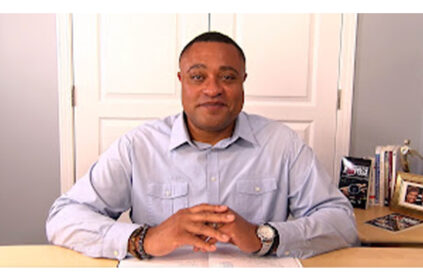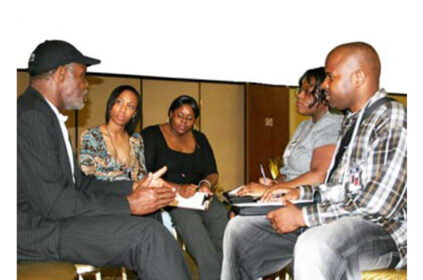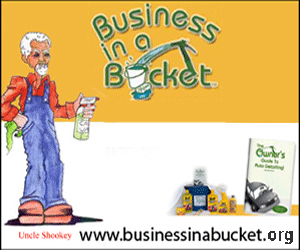Interviewed and written by Aaron Robinson – Editor
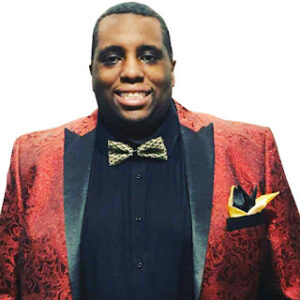
7x Grammy Award-winning music producer and autism activist Marcus Boyd has been giving back and fighting for his community as a voice for autism. Beating the odds while living with autism was a challenge, however, a gift from God as he continues to live his dream and follow his passion no matter the circumstances that he may face.
Recently, Marcus Boyd was honored at the Atlanta Hip Hop Day where he received a Pioneer Award. He was also honored at The Stone Awards in Memphis, Tennessee. In 2020 Marcus Boyd will begin working on his worldwide clothing brand, ART’istic Wear Clothing that will give light and honor to the autism community. That is not the only goal he looks to achieve as he sets out more goals while being the founder of A Solid Music Note Foundation.
I had the opportunity to interview Marcus Boyd. Here is what he had to share with the readers regarding Autism and his amazing, yet latest happenings.
Aaron Robinson: What do you feel is your ultimate purpose in life?
Marcus Boyd: I use to feel like it was music. Now, it changed to being a voice, being an activist and telling my story, to help encourage and to help give knowledge and wisdom for those who are in my community – the autism community.
Aaron: With all that you’ve been through at a young age, what type of gratification is it for you to be a successful producer in the music industry?
Marcus: I just give all praise to God. I give praise to my grandmother; I give praise to my family that helped raise me. It’s just a lot of people in this village who helped raise me to be the guy that I am today. My only gratification is to know that one day I can reach my son or teach somebody else’s son the proper way and the best way to do this music.
Aaron: When did you realize that you had a musical gift?
Marcus: I didn’t start talking until I was 13 at a two year old level. I didn’t have a bunch of friends. My family were my friends. My grandma gave me a trumpet when I was in 3rd or 4th grade. Just because I couldn’t talk, that didn’t mean that I couldn’t really understand. I understood what people were saying out there mouths. The lessons that were being taught to me helped me to be able to start playing the trumpet.
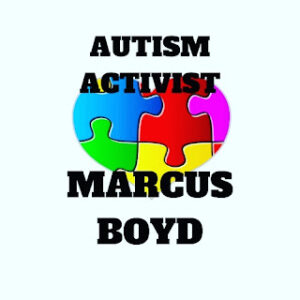
Aaron: Marcus, you are an educated man, a businessman, and a family man. You have accomplished many that most cannot. What do you feel was the remedy for you to overcome the adversities that most autistic people fail to overcome?
Marcus: I just really had a praying grandma. She only had PBN as a television channel. Then I had the family support, my behavior aide, my speech therapist, my therapist, my doctor, and my social worker. It was a bunch of people that actually helped me with sticker notes…reading material. My therapist use to come pick me up every weekend to go over to her house with her children and family. They use to help educate me – the stuff that school wasn’t doing because I was in Special Ed and I had emotional problems. When I was having these problems in school they wanted to put me in Special Ed classrooms. Then it got to a point that they wanted me to stay home because it was getting to be too much for the other kids. I was disruptive. So, you are dealing with somebody that had severe emotional problems [jumping on people, scratching them, biting them]. I was trying to live a normal life. It was just really hard.
Aaron: Do you feel that the school system failed you and that they didn’t really treat the symptoms that you had?
Marcus: I mean we talking about the late 80’s, early 90’s. I didn’t even know that I was a part of the Special Olympics, but I was for years. This was way before No Kids Left Behind. I did have those special teachers where I attended a school for physical and mental disability. They had the time out rooms. They had different stuff but I don’t think it was equipped to be able to understand autism, its behavior and its dynamics.
Aaron: Do you still have any symptoms that still affect your livelihood?
Marcus: Yes, I still have emotional problems. I throw my bed and my TV. I still cry. I still don’t trust people. I still like certain colors. Even though I’m a music producer I still don’t like loud noises. It’s not like this is a disease. It’s a gift from God. It’s not like you give me some medicine and I’m going to get over it. I didn’t stop jumping on people, biting and scratching them until I was 24 years old. When I was 17 and 18 I was still having problems using the bathroom by myself. I’m going to be 37; I still have episodes. I still deal with it, but it’s the way you deal with it. Music is my comfort. One way I deal with my problems is that I put on my headphones and I just listen to my favorite songs until I can’t listen to them anymore. Another thing is that I talk to the people that are in my village. I call them up. I don’t care if its 4 o’clock in the morning. They know that Marcus must be having a problem if I’m calling them at 4 o’clock in the morning. They’re willing to get up and listen to me without any judgment.

Aaron: Marcus, for those individuals who are living with autism, that are capable, however, who feel that they cannot fulfill their dreams and purpose as you did, what words of encouragement would you share with them?
Marcus: As long as we put God first, any and all things are possible. There are parents of children with autism or parents and grown adults with autism. Even if you’re a child not at the level of speaking at this point, never waiver your faith. Always know that God is a God of all things. They told my grandmother at 11 years old that the left side of my brain does not function correctly, and with little of education that I will always need adult care to feed me, clothe me, and bathe me. I’ve been on my own since 17. I have a college degree. Never give up on that child because you might be giving up on the next president, the next congressman, the next basketball coach, or the next football player. You’ve just seen the young man from America’s Got Talent, he’s blind and he’s got autism. And he won it! That is my inspiration.
Aaron: You dedicated a lot of time by giving back to your community and beyond. Why do you feel that it’s important for you to give back?
Marcus: It’s important because somebody gave to me. My behavior aide, he was a Caucasian guy, 50ish, and he use to say, “Marcus”, I was 8 years old and I couldn’t talk or anything. He said, “Marcus, if you channel yourself more, you can be more.” He use to take me to Braves and Falcons games, and Cracker Barrel. My goal was to have 8 hours of a good day. If I accomplished my goal, I would get to go to a wrestling match… a Ringling Bros. and Barnum & Bailey Circus. That is where I was able to go to as a reward. It shouldn’t have been that, but in my case, it needed to be that. People have sacrificed their family, time, and their businesses. They had seen something more than I seen in myself.
Aaron: That’s heavy! That’s heavy! You are an activist for autism, what is your goal and where do you see yourself 10 years from now, as far as you having a voice and sharing your testimony?
Marcus: One of my goals is to continue with my foundation, A Silent Music Note Foundation located in Atlanta, Georgia…to continue to give back, whether school supplies, clothes, knowledge, food or whatever the autism community needs. I’m not saying that other communities don’t need this as well, but I can only focus on the community that I was birthed into. I teamed up with my business partner Brian K. Marshall of the ATL’s Hottest Entertainment Awards in Atlanta, Georgia. This is the first year that we have an ATL’s Hottest Specials Awards where we are going to celebrate and give real awards to the mental health community. We want to let them know that they’re not forgotten, that they’re loved and that their voices matter. As far as 10 years from now, my goal is to keep helping improve the lives of autism people around the world.
Aaron: I can ask you so many questions. One speaker I listen to spoke on a situation where they are giving these kids different medications, such as Ritalin. It’s more of a, how can I say it…
Marcus: A control factor. I was on Ritalin, Deflazacort, Lithium, Paxil, Sevaquil and more. So I’m telling parents; I’m telling caregivers. I know children’s attitudes may be a little rough, but don’t put them on 500 to 1000 milligrams because you will zombify them. Some people have said that they are only on 25 milligrams. Do not put them on 500 to 1000 milligrams. That’s the wrong answer.
Aaron: Do you think that’s what they are doing so when they get older they won’t be able to be functional in society when they reach adulthood?
Marcus: I do think that. When I was 5, 6, and 7 years old, they were giving me 250 – 300 milligrams. Most kid’s bodies cannot contain that much medication. It sounds like, okay it’s only 250 milligrams, 1 pill. No! It’s what’s inside of the medication. It’s terrible. That is the way to control them, because they can’t get the behavior in order. The deacons at my grandma’s church use to say “it’s nothing wrong with that boy, he just got a demon in him. Let’s get some holy oil on him and get a belt.” You know how many times I’ve been baptized as a child because my grandma use to listen to the deacons in the church. Every time I’ve got prayed for, I mean it’s like, “Okay! Yeah, let’s get these demons out of him!” What demons? I’m dealing with this issue! There is no demon! No one said, “Okay, he has autism.” I got diagnosed with autism on April 12th 1993. I was 10.
Aaron: Interesting. I’m going to switch it up a little. Do you have any upcoming projects that you are working on, as far as music production or anything that you would like to talk about Marcus?
Marcus: Of course! I have a movie project called Backwards. I’m one of the composers. We’re working on a new film with Andre Harris. I just keep on musically working. It’s just a lot going on and I’m just blessed.
Aaron: For those artist and producers who’s out there grinding but say that they have no way out and would never be successful, do you have any words of encouragement for them?
Marcus: Yes I do. Don’t make the same mistake that I made. Read your contracts. Read the small lines. Read all the print words before you sign anything, and get an entertainment lawyer. When you feel like you are not going to make it, that’s when you are about to make it, because nothing happens without struggle! I’ve been a music producer for almost 20 years. I was sleeping in dumpsters and eating out of trash cans for three years because I wanted to be a music producer. Nothing happens without struggle! Once you get pass your season of struggle you are going to make it! Make sure you are making the right contacts. Don’t just send your CD, USB flash drive and your thumb drive out to everybody because you feel like they may be able to give you an opportunity. Create your own. Yes!!! Create your own! Don’t wait for a door to open. You create and open that door yourself.
Aaron: Absolutely, that’s great advice. And before we end the interview Marcus would you like to add anything in closing that we haven’t talked about?
Marcus: Be looking out more from A Solid Music Note Foundation. Also thank you, your magazine, your team and your supporters. If you don’t support businesses out there making a way for other businesses that have a voice then there isn’t any point of you doing it.
https://www.facebook.com/MARCUSBOYDCHRISTIANHIPHOP/
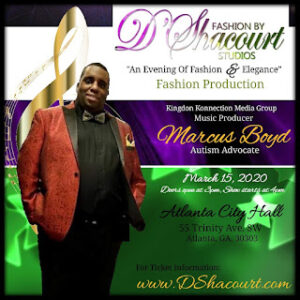
Last modified: June 24, 2023




